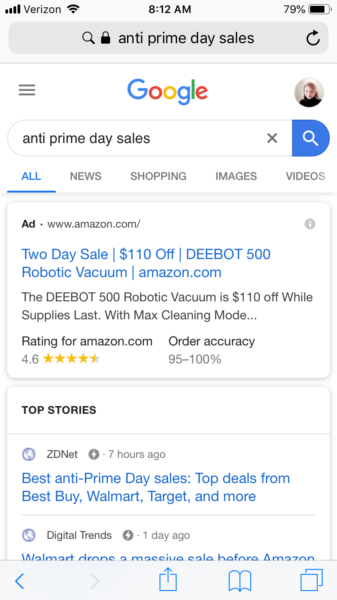Amazon’s got a PPC lock on “Prime Day”
Whether by choice or not isn’t clear, but competitors are sitting on the sidelines of “prime day” ad auctions.
If you’re looking for “competing Prime Day deals,” you’ll find plenty of articles on how other retailers and competitors such as Walmart, Target and eBay. But you aren’t likely to find any ads from those competitors.
No ads when searching for competing retailer deals
In some cases, Google shows Top Stories and no ads at all:

In other cases (this time incognito), an Amazon ad is the only ad that appears on the results page:

It may be that brands and retailers aren’t bidding on “prime day” keywords. We’ve reached out to a number of agencies that work with retail clients, and they said they weren’t bidding on “prime day” keywords. At the same time, they found it odd that Amazon appears to be the sole advertiser.
No ads for non-branded “competing deals”
Even when searching for “anti prime deals” or “competing prime deals” where the intent is clearly to find non-Amazon results.

Amazon ran general Prime Day sale ads as well as product-specific ads such as the Deebot ad seen below.

We’re seeing the same treatment on Bing as well.

Not without precedent
We asked Google if Amazon had a kind of whitelisting arrangement to keep other ads from appearing on “prime day” search results. This wouldn’t be without precedent. The search engines may limit ads to official sponsors, as in the case of the Olympics, or opt to not show ads at all, as Bing has done for Super Bowl queries. A Google spokesperson said it doesn’t disclose that kind of information about advertisers.
We’ve reached out to Amazon for comment but have not received a response.
The organic news results — and likely your email inbox — indicate Amazon’s competitors are heavily promoting their own sales during these two days. It’s just not clear if those competitors aren’t using paid search for “Prime Day” because they don’t want to or because they can’t.
